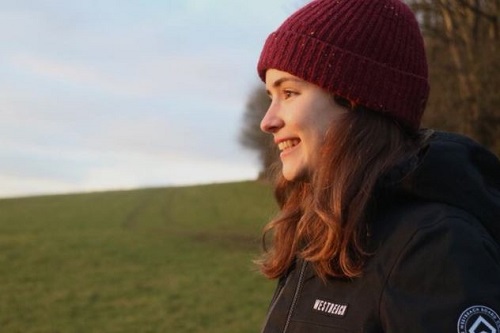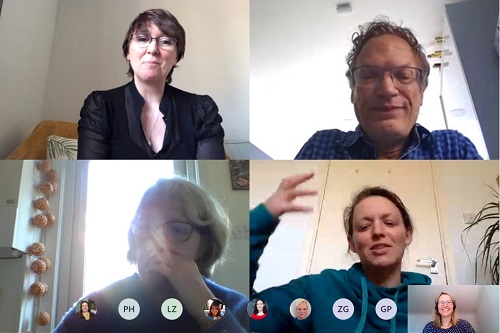Filmmaker Lydia Shellien-Walker has been a regular participant in the online group mindfulness sessions delivered by City’s Centre for Excellence in Mindfulness Research (CEMR) during the pandemic, and kindly shares what she has learned.
By Mr Shamim Quadir (Senior Communications Officer), Published
Lydia Shellien-Walker is a filmmaker and content producer who joined City’s Centre for Excellence in Mindfulness Research (CEMR) group mindfulness sessions when they moved online due to the COVID-19 pandemic. As the group took some time out for the summer, Lydia took time to reflect and pen her thoughts on what she had learnt from spending 18 months in a mindful community.

Lydia Shellien-Walker
She shares:
“Our mindful community has been a lifeline in a year of confusion, uncertainty, and anxiety.
“Three times a week, over Zoom, we have been practising mindfulness together for over 18 months. I was drawn to the idea of having a regular time to practise, and jumped at the opportunity to be guided by experts at the Centre for Excellence in Mindfulness Research at City University.
“The drop-in sessions are now hosted online, being delivered three times per week, taking place from 12:30 – 1pm every Monday, Wednesday and Friday, on Zoom.
“I am so grateful to The Centre’s co-founders and directors, Dr Trudi Edginton and Dr Jutta Tobias Mortlock for organising and maintaining these drop-in sessions throughout the pandemic. They have provided a much-needed space to stop, to connect and to breathe.”
Reflecting on how much she found the community to matter, she adds:
“I’ve never managed to get myself into a regular mindfulness routine. I’ve been very keen for a week or two, practising with an app or YouTube videos, then dropping off completely.
“Regular practice at the CEMR, knowing that there is a group of people waiting, three times a week at the same time each day, provided a big motivation. Now I have a regular routine.
“It helps knowing that there will be a group of people there when you show up. A group of people with a shared goal, and who want to share and to hear what one another have to say. Just logging on and seeing these familiar faces brought a sense of connection at a time of immense isolation.“
Lydia also found that checking in (and out) with the community had been crucial:
“For me, checking in and out as a community is as important as the practice of mindfulness itself.
“In our online group, we start by checking in with one another, sharing how we feel, a challenge we’re facing, our ‘internal weather’. Then we practise together. After the practice, we always discuss how it went for us, what came up, or a word or focus we’d like to keep with ourselves for the rest of the day.
“It’s a space to talk about how we are really feeling that day, to be heard by our shared community. It is amazing how this space fosters honesty and openness among otherwise complete strangers. The surprise of seeing so many nodding heads on screen as you share the anxieties of your day, your sleepless night or your stress inspires a feeling of validation. Not only have you been heard but there are others feeling the way you do. To be heard and to be understood in this way is very powerful.”

A CEMR mindfulness drop-in session delivered online
Over time, Lydia says she also realised the importance of simply coming along to the mindfulness sessions and taking things from there, remarking:
“It’s amazing how many times we’ve said to one another, ‘I have such a busy day, I don’t think I have time for this’ or, ‘I really didn’t feel like it today’.“
“But when we’ve come with what we’ve got, mindfulness creates time, rather than taking it. When I spend 10 minutes stopping and breathing, my afternoon is infused with a focus that renews my energy and refocuses my attention, allowing me to work more effectively and with more enjoyment.”
Another learning point Lydia found was that mindfulness doesn’t always have to feel good, as she remarks:
“We’ve practised sitting with discomfort. There has been a lot of discomfort this past 18 months to contend with - anxiety, fear, uncertainty, concern for loved ones and for the state of the world. I have learnt that it is not about chasing those feelings away, but learning to be with them.
“We have practised welcoming in our feelings, sitting with them and getting to know them. The metaphor that is often explored in mindfulness is one of being a gracious host at a party, inviting all of the guests in, whether you like them or not. Sit them down and talk with them. Be curious about what they have to say. I found that sometimes what my uncomfortable feelings had to say was helpful, and if it wasn’t, they lost their fearsome energy once I'd had a chance to investigate.”
However, she also found that there had been breakthroughs, commenting:
“During one practice, we were told we would focus on the smallest possible point of attention. We began with bringing our attention to the breath. Then to the point where we felt the breath most keenly. Then to the left nostril. Then to one singular hair of the left nostril.
“After some minutes of bringing our attention to a smaller and smaller point of focus, we were then encouraged to pull our attention back out again, to our bodies, the room we were in, our street, our city, the world.
“I felt an expansiveness that had eluded me for 18 months, living in a flat throughout the pandemic. With this sense of expansiveness came a sense of possibility. I realised I had been stuck in the feeling that things would never change. But now, I had a sense that they could. “
Ultimately, Lydia says she has found that, as with anything worthwhile, it’s all about practice:
“I used to think that one day I would ‘crack’ meditation. That one day I would ‘be able to meditate’. What I've learnt from practising mindfulness for a year and a half is that, like any skill we learn, or like keeping the body fit, it ebbs and flows with practice. Like going for a run, sometimes you feel great and sometimes you feel sluggish. But it’s all in the practice.”
Welcome to our community!
CEMR, City’s Centre for Excellence in Mindfulness Research, would love to welcome you to its mindful community. The drop-in sessions are currently from 12:30 – 1pm every Monday, Wednesday and Friday (except Bank Holidays), on Zoom.
Anyone is welcome to join. Please contact Dr Jutta Tobias Mortlock for details on how to join the session.
For more details about the Centre for Excellence in Mindfulness Research, please visit CEMR website.
